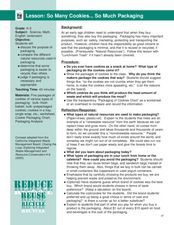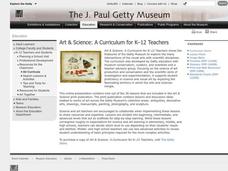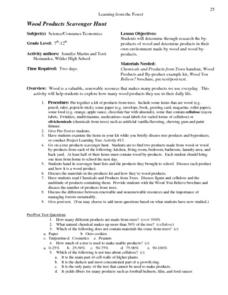Curated OER
Our Treasured Trees
Students discuss natural resources and renewable resources with trees being considered renewable resources which need special attention. In this Earth science lesson, students write a list of reasons for why it would be good to stop...
Curated OER
Renewable Resources: Ancient Civilizations
Students examine how ancient people used natural resources. In this renewable resource lesson, students will be put into 5 groups each focusing on a different past civilization. Each group will identify they types of resources their...
Curated OER
Waves : An Alternative Energy Source
Students evaluate the feasibility of wave energy as an alternative source of energy. In this alternative energy source lesson students are introduced to renewable and nonrenewable energy and study energy production.
Curated OER
Discover How Trees Produce and Conserve Energy
Students discover the flow of energy from plants to humans, the importance of this and how the energy chain is effected. In this informational lesson plan students will see how energy is produced and conserved by trees and how it...
Curated OER
So Many Cookies...So Much Packaging
Students explore the way packaging is used in the distribution of goods. In this packaging lesson plan, students investigate how packaging is used, what resources are used to make it and ways it can be recycled.
Curated OER
Energy Source Puzzles
Students identify renewable and nonrenewable resources. In this energy source instructional activity, students participate in a game to identify the various types of resources. There are various extensions to this instructional activity,...
Curated OER
Resources
In this resources worksheet, students review how reducing, reusing, and recycling help to conserve resources. Students compare renewable resources with non-renewable resource. This worksheet has 27 short answer questions.
Curated OER
Natural Resources
In this natural resources worksheet, students compare and contrast renewable and nonrenewable resources. This worksheet has 1 fill in the blank and 9 short answer questions.
Curated OER
Resources
In this resources worksheet, learners review renewable and nonrenewable resources. Students also review how resources can be conserved. This worksheet has 7 terms in a crossword puzzle, 3 true or false, and 10 short answer questions.
Curated OER
Energy Resources
In this energy worksheet, students will review the different types of energy and how energy can be created and conserved. This worksheet has 10 matching and 11 short answer questions.
Curated OER
Natural Resources
In this natural resources worksheet, students will brainstorm 3 examples of renewable resources and 3 examples of nonrenewable resources. This worksheet is a graphic organizer.
Curated OER
How Can Resources Be Conserved?
In this resources worksheet, students will list problems associated with using natural resources. Then students will come up with possible solutions for conserving those resources. This worksheet is a graphic organizer.
Curated OER
What Are Nonrenewable Resources?
In this resources worksheet, students will compare and contrast examples of renewable resources and nonrenewable resources. This worksheet is a graphic organizer.
Curated OER
Renewable/Nonrenewable Resources
Fourth graders classify resources as renewable or nonrenewable while playing a board game. They read King John story and discuss the story. Students explore renewable and nonrenewable resources. They play the resources game that show...
Curated OER
Medieval Natural Resources
Students discuss and view examples of the illuminated manuscripts that were created during medieval times and into the Renaissance. In small groups, they research the resources that were used to create the manuscripts and classify them...
Curated OER
Population and resources(
Students describe what a consumer is and give examples of how we affect the earth. They explain how we as consumers can change our actions to have less of an impact. Students discuss "How can we reduce the size of our footprint?"
Curated OER
Fossil Fuels vs. Alternative Fueling Systems
Fourth graders brainstorm the differences between the fossil fuels that people use in their transportation now and what they could use to minimize greenhouse gas emissions. They use a variety of techniques from webquests to writing...
Curated OER
Forest Stewardship
Students define the term forest stewardship and they identify good forest stewardship practices. They are asked:"Does anyone enjoy spending time in the woods?" Students identify techniques of practicing good forest stewardship (taking...
Curated OER
SUSTAINABLE AGRISCIENCE
High schoolers, after defining sustainable agriscience, distinguishing between renewable and nonrenewable resources and identify the basic components of a sustainable agriscience system, develop a sustainable agriscience system. They...
Curated OER
Thinking about Energy
Students examine their understandings about energy concepts by completing an online survey. Students participate in a class discussion about their uses of resources and the differences between perpetual, renewable, and nonrenewable...
Curated OER
Renewable vs. Non-Renewable Resources
Fifth graders identify renewable vs. non-renewable resources and comprehend why conservation of resources is important. They are asked what they think the words natural and resource mean. Pupils then put the words together to define...
Curated OER
Naturally Speaking
Students identify the Earth's natural resources and classify them as renewable or non-renewable. They simulate the distribution of resources and discuss the fairness and effectiveness of the distribution. They identify ways that they use...
Curated OER
Wood Products Scavenger Hunt
Students investigate the by-products of wood and explore the wood products in their own environment. Products containing both cellulose and silvichemicals obtained from the trees are examined in this lesson.
Curated OER
Earth Kids: Kindergarteners Taking Care of the Earth
Students explore a variety of ways of how to care for the environment in the nine lessons of this unit. They observe how to be responsible "Earth Kids."

























